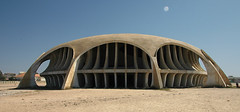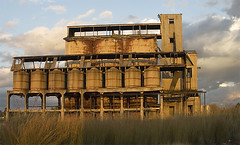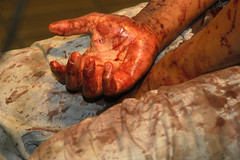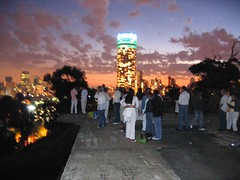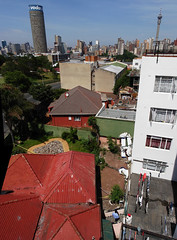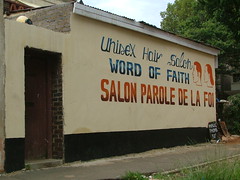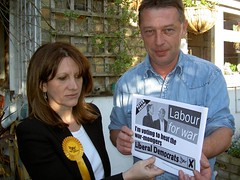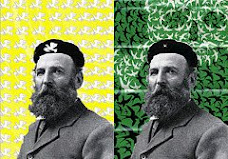A free market in telecoms is near impossible. But many young tech enthusiasts are blissfully ignorant to this fact. South Africa is no different. Often one hears the mantra, by the ZA-digirati: If only there was proper competition in South Africa, then the outrageous internet and telecoms costs would come down.
Telkom Hellkom Djouma
Originally uploaded by Deon Louw Botha. How does this idea explain this story then?
Mhambi read via Wired Gecko about report on Engadget that the Indian Government aims to supply each citizen with a 2Mbps internet connection by 2009. Wow, amazing.
"...now the real hotness is in connecting up an entire nation. According to IndiaTimes, the government is proposing that all citizens of India receive complimentary 2Mbps internet by 2009, and the service would be provided by the state-owned BSNL and MTNL. Officials backing the plan are hoping that giving all residents access to high-speed internet would "boost economic activity""
The government intervening to supply cheap telecoms dumbfounds most of the tech ideologues. Even when it worked before in places like South Korea.
Ideologues?
Yip, you heard me. In the West the prevailing orthodoxy is such - there must be competition in telecoms provision, because the free market must prevail, service will spread and it will drive down prices. A British academic, Richard Barbrook, hit the nail on head when he coined this pervasive ideology the Californian ideology. It's worth a read.
A brief look at the history of telecoms should indicate that things are not that simple. Telecoms tend to be natural monopolies. The economic value of the network rises exponentially with the connections or users added, and considering the costs of constructing the network, especially the last mile, it's economically inefficient to have two separate networks. If left alone the larger network will swallow the smaller.
In practise Western governments accepted this fact. The USA realised that for the US to get a large network they should allow AT&T to develop unhindered, but to regulate the prices and the the roll-out to sub economic parts of the country (called universal service). Although nominally a private company Ma Bel (AT&T) under these conditions grew fast and provided all Americans with cheap phone calls. The government regulated its prices but the economy of scale it achieved made it still possible for AT&T to be hugely profitable.
In the 80's with the rise of Thatcherism and Ronald Reagan, right wing ideologues launched an assault on this old idea of a public telephone monopoly under government control. Competition was forced into all markets and also this market. But this particular one was no free market. To create competition a web of legislation, regulation and monitoring had to be spun, else the incumbents would just swallow up the new comers.
After more than a decade of a dearth of true competition, the UK started showing some of its benefits in 2003. Broadband prices started to fall, and true competitors entered the market. By this time however countries like South Korea enjoyed much higher bandwidth at lower prices for a number of years. That is broadband provided by monopoly state owned companies.
Why had competition taken so long to take hold in the UK? BT, the UK incumbent, had tried every trick in the book to forestall competition in the last mile. (The so-called local loop.) Competitors had to be allowed to connect to BT's local exchanges, because it would not have been economical for them to replicate this infrastructure. It was even claimed that BT had engineered its technical protocalls to interface less effeciently with that of its rivals. But with the vast amount of resources thrown at the problem of opening up BT (including regulatory splitting it into two seperate parts, one of which only business is to allow acces to the local loop), eventually it paid dividends.
In the US they did not try to solve the real problem at all. Instead of opening the local loop they split AT&T into a number of geographically defined telcos. They kept them separate via regulation. Each was a monopoly in his own back yard. Prices predictably went up. Today with regulation lifted somewhat, the telcos are swallowing each other once again.
What can South Africa learn from the US, UK and Korean experience?
It is possible to create a competitive market of sorts in telecoms, but it takes years, and complex legal and technical regulation, constant vigilance and strong willed enforcement. The simpler route to the information super highway, is to ditch the copious amounts of regulation and have one national monopoly, with no or little profit motive.
Currently, with Telkom, South Africa has the worst of both worlds. A private company that's not properly regulated. That coupled with tech stake holders barking up the wrong ideological trees is a recipe for disaster. No wonder predatory elites can use this state of affairs to milk South African internet users dry.
Sunday, April 29, 2007
Telkom should be nationalised now
Posted by
Wessel
at
2:05 am
4
comments
![]()
Labels: economic social indicators, technology
Saturday, April 28, 2007
Behind the Boerewors curtain
"It's like rice in Japan, we will always be here...": Said a peroxide blond boy in a heavy Afrikaans but definitely camp accent.
Mhambi accompanied a long time gay friend to a screening of two documentaries at the UK National Film Theater about gay life in South Africa. Black Beulah's and Behind the Boerewors curtain.
Black Beulahs is a well crafted film and was interesting for what it was not showing. In its world black South African gay men don't really interact much with white ones, except events like the gay pride marches, which tend to be disproportionally white.
Considering the conservatism and prevailing discourse that being gay is a Western import this is not surprising. But the film never explores the antagonism towards being gay in the black community or the apartheid within the community. Still its an interesting insight into a world not often seen.
All the men in this movie are relatively wealthy and deals with the same issues as gay men the world over.
Behind the Boerewors curtain is a film about a minority in a minority in a minority in a minority. Not only are they gay, but they are white, and Afrikaans AND they like to to listen to Boeremusiek and lang-arm (a kind of close and paired dancing which we used to derisory call wind-surfing. See the dancing see the clip below).
Now my friend comes from a small Afrikaner town in the Northern province and is a rather accomplished lang-arm dancer. But he claims he and his fellow Afrikaans moffies would not be seen dead dancing lang-arm. He cringed embarrassed in his seat next to me, while people were spinning around each other on the screen.
Still the film provides evidence that there is allot of gay lang-arm dancing going on. It's a short flick, but it all revolves on the meaning of dancing in this particular way. And according to the dancers - both gay males and lesbians - the reason is that they are Afrikaans. It's an expression of who they are. Yes they say, others think that if we dance like this that we are racist.
In the end, they don't try to defend their gayness. They defend their Afrikaansness. They claim that being Afrikaans is so part of South Africa, it's like rice in Japan, it will never die out.
Here's a Youtube clip of lang-arm dancing. It seems the dancing has made it's way to London.
Posted by
Wessel
at
8:11 am
3
comments
![]()
Labels: Africaness, gay and lesbian, identityPolitics, video
Polygamous Lesbians - the African way?
Can you be Gay and African? Is cultural identity or sexuality something you are born with or something you learn?
The wedding invitation.
The BBC reports a facinating case of Aunty Maiduguri. A Nigerian lesbian who married four women last weekend in Kano State. Like in much of Africa Lesbianism is illegal under Nigeria's national penal code. Although not illegal in South Africa, South African lesbians have been known to be subjected to so-called corrective rape. Rape that is supposed to cure to errant women of lesbianism.
Even mainstream commentators like Sehlare Makgetlaneng, head of the southern Africa desk at the Africa Institute of South Africa, a Pretoria-based think-tank claimed that being gay is not African.
But Aunty Maiduguri did something which is claimed to be un-African in a way which is also at times claimed to be very African, namely polygamy. In the process she has not only provided further evidence that Africans are often gay, but also posed some interesting questions.
Must her polygamy trouble the feminists or those that strive for equal rights for women? If her lesbianism is natural and not culturally specific, what is her polygamy? Is their anything specific to lesbian sexuality that makes polygamy attractive or has she learnt polygamy from African custom?
Posted by
Wessel
at
7:27 am
0
comments
![]()
Labels: Africaness, gay and lesbian, identityPolitics
Monday, April 23, 2007
Mhambi's obsessions
At last Mhambi was transferred to Google's brand spanking new blogger, complete with categories! Now you can easily navigate my blog and find out I'm obsessed - amonst other things - with Identity politics, and General named De la Rey, what the Brits (or should that be the English) think of Afrikaners, the potential of technology and the web and Flickr sirens Rose and Olive.
Speaking of which, hows this for yet another gorgeous photo by the girls from Texas.
Posted by
Wessel
at
4:37 am
0
comments
![]()
Labels: FlickrPhotoGraphers, Girls are gorgeous, Rose and Olive
Sunday, April 15, 2007
Rider Haggart and why the British love to hate Afrikaners
Is Mhambi deluded? Are Afrikaners the scum of the earth? Or... are the British perhaps sanctimonious hypocritical bigots?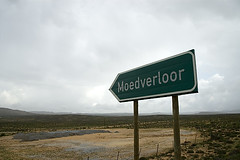
moedverloor
Originally uploaded by Christo Doherty.
Pity me for caring about this. It's the cross Mhambi has to bear. On Wednesday evening Mhambi was half watching BBC2 while surfing the Net. A program Adventure for Boys: The Lost Worlds of Rider Haggard was on. Only the previous evening the same series featured John Buchan. Commentators like conservative politician William Hague sang Haggard's praises.
The first program was interesting but not a little dubious, but this time the program's inaccuracies, arrogance and facile racism had me flabbergasted. So audacious was it, that I felt, I was perhaps wrong?
To summarise the program's central theme: Haggard was a jolly good fellow and a talented writer. Africa was a dark continent unknown to Europeans back then, but Haggart went were angels fear to tread. In the context of his time he was'nt a racist, in fact, although he called Africans violent savages he admired them as noble - especially the Zulus. And tried in vain to protect the Zulus from the evil exploitative Boers, which was why he was pro the annexation of the Transvaal Republic. The Boers were nothing but Europeans gone very bad.
Such was the assurance with which this message was transmitted over a respected TV channel, that it lay some seeds of doubt in my mind. I love history and although I'm very aware that the British and particularly the English think were incurably racist, I had never heard this particular version of history.
But perhaps my closeted upbringing in South Africa had protected me from even a few more unsavoury aspects of my tribes behaviour than those I was already aware of.
I am aware. I was one of the only 4000 regular buyers of the left independent Afrikaner paper Vrye Weekblad when it exposed the apartheid state's death squads. Mhambi was employed an investigator at the Truth and Reconciliation (TRC) for two and a half years. My beat was a string of massacres in the Vaal from 1990 to 1993, including the famous Boipatong massacre, an industrial area South of Johannesburg. I was quite aware of what my tribe was accused and capable of.
But I knew that there were no Zulus in the Transvaal back then. Something was rotten in what the program proclaimed. So Mhambi did a bit more research.
Rider Haggard
Who was the jolly fellow? Rider was a Victorian writer who wrote adventure stories set in exotic lost worlds, the best known which is King Solomon's mines.
One of many children his father - A Sir and a barrister - thought him the most unremarkable of his 10 kids and that an expensive private (called public schools in the UK) school education would be lost on him. After failing the British army entrance, Haggard was sent by his father in 1875 to Natal as an unpaid secretary to Sir Henry Bulwer, Governor of Natal colony. A colony which itself was a Boer Republic until taken by the British some 30 years before.
Indicating perhaps the little importance the British attached to the landlocked Boer Republic bordering Natal (no gold had been discovered yet), and being at the right place in the right time, Haggard was sent as the British envoy to annex the South African Republic (The Transvaal).
Haggard himself raised the Union Flag in Pretoria and was forced to read out much of the proclamation following the loss of voice of the official originally entrusted with the duty. He was very proud none the less. It was 1877 and the British now controlled Africa, from the Cape to Cairo.
Haggard wanted to return to England to marry his childhood sweet heart, but his father forbade him, telling him in no uncertain terms to first establish his career in the colonies. And so Haggard stayed in the Transvaal as Master and Registrar of the High Court. A very senior position in the now ex-Republic.
Haggard seemed to have been imbued with the British colonial sense of purpose: to civilise the the Natives and the Boers.
"The position of South Africa with reference to the Mother Country is somewhat different to that of her sister Colonies, in that she is regarded, not so much with apathy tinged with dislike, as with downright disgust. This feeling has its foundation in the many troubles and expenses in which this country has been recently involved, through local complications in the Cape, Zululand, and the Transvaal: and indeed is little to be wondered at. But, whilst a large portion of the press has united with a powerful party of politicians in directing a continuous stream of abuse on to the heads of the white inhabitants of South Africa, whom they do not scruple to accuse of having created the recent disturbances in order to reap a money profit from them...Trouble was brewing in Haggard's fiefdom and he wanted the Empire to engage fully for fear that the British would loose control. The Boers were restless, agitating to get their independence back. In his personal life things were not better because back in blighty his sweet-heart married another man.
Now, if there is any country dependent on England that requires the application to the conduct of its affairs of a firm, considered, and consistent policy, that country is South Africa. Boers and Natives are quite incapable of realising the political necessities of any of our parties, or of understanding why their true interests should be sacrificed in order to minister to those necessities."
Haggard left for England just as things were hotting up in the ex-republic.
Towards the end of 1880 the republican forces issued an ultimatum, independence or war. The British government dismissed it out of hand. Sure that the Empire would not tolerate the insurrection Haggard had returned to South Africa, but waited in Natal for the British military to establish control. When hostilities broke out he was still in Natal desperately waiting for British victory.
But the British suffered a string of defeats, and soon in 1881 the Transvaal regained its independence. Haggard was devastated.
But unlike the assertion in the TV program that the War was fought to protect the Zulus, the truth, which I knew and was confirmed when I researched it, was quite the contrary. The reasoning of prime minister Gladstone in giving independence was this: Further losses and instability could encourage the Zulus, adjacent to the Republic to also rise up against the British control. The British had just managed (in 1878) to subjugate the Zulus after the massive Zulu war. Something incidentally the Boers had never attempted.
Haggard, who was not present in Pretoria, praised the bravery of the loyal subjects of the crown who remained in Pretoria:
"On the news of this disaster reaching Pretoria, Sir Owen Lanyon issued a proclamation placing the country under martial law. As the town was large, straggling, and incapable of defence, all the inhabitants, amounting to over four thousand souls, were ordered up to camp, where the best arrangements possible were made for their convenience. In these quarters they remained for three months, driven from their comfortable homes, and cheerfully enduring all the hardships, want, and discomforts consequence on their position, whilst they waited in patience for the appearance of that relieving column that never came. People in England hardly understand what these men and women went through because they chose to remain loyal. Let them suppose that all the inhabitants of an ordinary English town, with the exception of the class known as poor people, which can hardly be said to exist in a colony, were at an hour's notice ordered--all, the aged, and the sick, delicate women, and tiny children--to leave their homes to the mercy of the enemy, and crowd up in a little space under shelter of a fort, with nothing but canvas tents or sheds to cover them from the fierce summer suns and rains, and the coarsest rations to feed them; whilst the husbands and brothers were daily engaged with a cunning and dangerous enemy, and sometimes brought home wounded or dead. They will, then, have some idea of what was gone through by the loyal people of Pretoria, in their weak confidence in thegood faith of the English Government."How ironic. Twenty years later as part of their scorched earth policy the British burned almost every house and farm in the Transvaal to the ground, killed the livestock, poisoned the wells, and forced all of the population they could find into concentration camps, where women and children lived in tents on open plains, while their men fought the British.
27,000 of the died, which was 10% of the population. Between 14,000 and 20,000 black South African also died in the camps. The Boers never claimed this was done on purpose. But why did this happen? I digress.
Haggard wrote a book - Cetywayo and his White Neighbours - upon his return to England proclaiming how calamitous this acceptance of Boer independence was. He agitated for intervention and subjugation of the Republic. The whole book it seems is available online to read, and I will quote from it liberally. But do go and read it yourself. The invective and accusations come thick and fast. The Heart of Darkness of the Afrikaner laid bear. And it's author is hailed on BBC2.
In other words before it was annexed by the British it was rather dull.
"The Transvaal is a country without a history. Its very existence was hardly known of until about fifty years ago. Of its past we know nothing. The generations who peopled its great plains have passed utterly out of the memory and even the traditions of man, leaving no monument to mark that they have existed, not even a tomb.
About the time that Mosilikatze was conquered, 1835-1840, the discontented Boers were leaving the Cape Colony exasperated at the emancipation of the slaves by the Imperial authorities. First they made their way to Natal, but being followed thither by the English flag they travelled further inland over the Vaal River and founded the town of Mooi River Dorp or Potchefstroom. Here they were joined by other malcontents from the Orange Sovereignty, which, although afterwards abandoned, was at that time a British possession. Acting upon The good old rule, the simple plan "Of let him take who has the power, And let him keep who can".
The Boers now proceeded to possess themselves of as much territory as they wanted. Nor was this a difficult task. The country was, as I have said, peopled by Macatees, who are a poor-spirited race as compared to the Zulus, and had had what little courage they possessed crushed out of them by the rough handling they had received at the hands of Mosilikatze and Dingaan. The Boers, they argued, could not treat them worse than the Zulus had done. Occasionally a Chief, bolder than the rest, would hold out, and then such an example was made of him and his people that few cared to follow in his footsteps.
The history of the Republic between 1852 and 1876 is not very interesting, and is besides too wearisome to enter into here."
It will be observed that the country is almost surrounded by native tribes. Besides these there are about one million native inhabitants living within its borders. In one district alone, Zoutpansberg, it is computed that there are 364,250 natives, as compared to about 750 whites.Haggard had a very low opinion of the Transvaal Boers but loved the country.
Altogether there is little doubt that the Transvaal is the richest of all the South African states, and had it remained under English rule it would, with the aid of English enterprise and capital, have become a very wealthy and prosperous country. However there is little chance of that now.
Personally Boers are fine men, but as a rule ugly. Their women-folk are good-looking in early life, but get very stout as they grow older. They, in common with most of their sex, understand how to use their tongues; indeed, it is said, that it was the women who caused the rising against the English Government.
None of the refinements of civilisation enter into the life of an ordinary Boer. He lives in a way that would shock an English labourer at twenty-five shillings the week, although he is very probably worthy fifteen or twenty thousand pounds. His home is but too frequently squalid and filthy to an extraordinary degree. He himself has no education, and does not care that his children should receive any. He lives by himself in the middle of a great plot of land, his nearest neighbour being perhaps ten or twelve miles away, caring but little for the news of the outside world, and nothing for its opinions, doing very little work, but growing daily richer through the increase of his flocks and herds.
His expenses are almost nothing, and as he gets older, wealth increases upon him. The events in his life consist of an occasional trip on "commando," against some native tribe, attending a few political meetings, and the journeys he makes with his family to the nearest town, some four times a year, in order to be present at "Nachtmaal" or communion.
Foreigners, especially Englishmen, he detests, but he is kindly and hospitable to his own people. Living isolated as he does, the lord of a little kingdom, he naturally comes to have a great idea of himself, and a corresponding contempt for all the rest of mankind. Laws and taxes are things distasteful to him, and he looks upon it as an impertinence that any court should venture to call him to account for his doings.
He is rich and prosperous, and the cares of poverty, and all the other troubles that fall to the lot of civilised men, do not affect him. He has no romance in him, nor any of the higher feelings and aspirations that are found in almost every other race; in short, unlike the Zulu he despises, there is little of the gentleman in his composition, though he is at times capable of acts of kindness and even generosity.
His happiness is to live alone in the great wilderness, with his children, his men-servants and his maid-servants, his flocks and his herds, the monarch of all he surveys. If civilisation presses him too closely, his remedy is a simple one. He sells his farm, packs up his goods and cash in his waggon, and starts for regions more congenially wild.
Such are some of the leading characteristics of that remarkable product of South Africa, the Transvaal Boer, who resembles no other white man in the world.
But wait there's more.
Perhaps, however, the most striking of all his oddities is his abhorrence of all government, more especially if that government be carried out according to English principles. The Boers have always been more or less in rebellion; they rebelled against the rule of the Company when the Cape belonged to Holland, they rebelled against the English Government in the Cape, they were always in a state of semi-rebellion against their own government in the Transvaal, and now they have for the second time, with the most complete success, rebelled against the English Government.
The fact of the matter is that the bulk of their number hate all Governments, because Governments enforce law and order, and they hate the English Government worst of all, because it enforces law and order most of all. It is not liberty they long for, but license. The "sturdy independence" of the Boer resolves itself into a determination not to have his affairs interfered with by any superior power whatsoever, and not to pay taxes if he can possibly avoid it.
But he has also a specific cause of complaint against the English Government, which would alone cause him to do his utmost to get rid of it, and that is its mode of dealing with natives, which is radically opposite to his own. This is the secret of Boer patriotism. To understand it, it must be remembered that the Englishman and the Boer look at natives from a different point of view. The Englishman, though he may not be very fond of him, at any rate regards the Kafir as a fellow human being with feelings like his own. The average Boer does not. He looks upon the "black creature" as having been delivered into his hand by the "Lord" for his own purposes, that is, to shoot and enslave.
He must not be blamed too harshly for this, for, besides being naturally of a somewhat hard disposition, hatred of the native is hereditary, and is partly induced by the history of many a bloody struggle. Also the native hates the Boer fully as much as the Boer hates the native, though with better reason.
Now native labour is a necessity to the Boer, because he will not as a rule do hard manual labour himself, and there must be some one to plant and garner the crops, and
herd the cattle. On the other hand, the natives are not anxious to serve the Boers, which means little or no pay and plenty of thick stick, and sometimes worse. The result of this state of affairs is that the Boer often has to rely on forced labour to a very great extent. But this is a thing that an English Government will not tolerate, and the consequence is that under its rule he cannot get the labour that is necessary to him.
But he does spare what he calls the Cape Boers and even to my surprise the Voortrekkers:
"These remarks must not be taken to apply to the Cape Boers, who are a superior class of men, since they, living under a settled and civilised Government, have been steadily improving, whilst their cousins, living every man for his own hand, have been deteriorating.
The old Voortrekkers, the fathers and grandfathers of the Transvaal Boer of to-day, were, without doubt, a very fine set of men, and occasionally you may in the Transvaal meet individuals of the same stamp whom it is a pleasure to know. But these are generally men of a certain age with some experience of the world; the younger men are very objectionable in their manners."
He even comments on the Boer's commando system and although he does not like it, it all seems rather egalitarian. All male citizens between 16 and 60 were liable for service:
"Each ward is expected to turn out its contingent ready and equipped for war, and this can only be done by seizing goods right and left. One unfortunate will have to find a waggon, another to deliver his favourite span of trek oxen, another his riding-horse, or some slaughter cattle, and so on. Even when the officer making the levy is desirous of doing his duty as fairly as he can, it is obvious that very great hardships must be inflicted under such a system. Requisitions are made more with regard to what is wanted, than with a view to an equitable distribution of demands; and like the Jews in the time of the Crusades, he who has got most must pay most, or take the consequences, which may be unpleasant. Articles which are not perishable, such as waggons, are supposed to be returned, but if they come back at all they are generally worthless.
In case of war, the native tribes living within the borders of the State are also expected to furnish contingents, and it is on them that most of the hard work of the campaign generally falls. They are put in the front of the battle, and have to do the hand-to-hand fighting, which, however, if of the Zulu race, they do not object to."
Allot of the shop keepers in the Republic were English, Haggard says:
Haggard recounts with indignation a campaign by the Republic with their allies the Swazies against Secucuni, a Basotho chief. Haggard decribes the Basothos as a timid race, not nearly as warrior like as the Zulus, while he casts apersions on the Boer Swazi pact. First proclaiming that the Boers copied what the English did in creating alliances, then doubting - the Swazis must have been coerced or tricked.
The revenue of the State is so arranged that the burden of it should fall as much as possible on the trading community and as little as possible on the farmer.
At first all went well, and the President, who accompanied the commando in person, succeeded in reducing a mountain stronghold, which, in his high-flown way, he called a "glorious victory" over a "Kafir Gibraltar."
"On the 14th July another engagement took place, when the Boers and Swazies attacked Johannes' stronghold. The place was taken with circumstances of great barbarity by the Swazies, for when the signal was given to advance the Boers did not move. Nearly all the women were killed, and the brains of the children were dashed out against the stones; in one instance, before the captive mother's face.
Johannes was badly wounded, and died two days afterwards. When he was dying he said to his brother, "I am going to die. I am thankful I do not die by the hands of these cowardly Boers, but by the hand of a black and courageous nation like myself . . ." He then took leave of his people, told his brother to read the Bible, and expired. The Swazies were so infuriated at the cowardice displayed by the Boers on this occasion that they returned home in great dudgeon.
Right.
Mr. Haggart goes on to list cases of forced labour he knows of. And after that, he lists massacres the Boers were involved in. He never saw this himself, but claims it on good authority. And there are many, here is but one:
"I do not relate these horrors out of any wish to rake up old stories to the prejudice of the Boers, but because I am describing the state of the country before the Annexation, in which they form an interesting and important item. Also, it is as well that people in England should know into what hands they have delivered over the native tribes who trusted in their protection.
The character of the Transvaal Boer and his sentiments towards the native races have not modified during the last five years, but, on the contrary, a large amount of energy, which has been accumulating during the period of British protection, will now be expended on their devoted heads.
These are strong words, but none too strong for the facts of the case. Injustice, cruelty, and rapine have always been the watchwords of the Transvaal Boers. The stories of wholesale slaughter in the earlier days of the Republic are very numerous. One of the best known of those shocking occurrences took place in the Zoutpansberg war in 1865. On this occasion a large number of Kafirs took refuge in caves, where the Boers smoked them to death. Some years afterwards Dr. Wangeman, whose account
is, I believe, thoroughly reliable, describes the scene of their operations in these words:
"The roof of the first cave was black with smoke; the remains of the logs which were burnt lay at the entrance. The floor was strewn with hundreds of skulls and skeletons. In confused heaps lay karosses, kerries, assegais, pots, spoons, snuff-boxes, and the bones of men, giving one the impression that this was the grave of a whole people.
Some estimate the number of those who perished here from twenty to thirty thousand. This is, I believe, too high. In the one chamber there were from two hundred to three hundred skeletons; the other chambers I did not visit."
He lists instances of slavery and claims that even the President of the Republic partook of it.
"It would be easy to find more reports of the slave-trading practices of the Boers, but as the above are fair samples it will not be necessary to do so. My readers will be able from them to form some opinion as to whether or not slavery or apprenticeship existed in the Transvaal. If they come to the conclusion that it did, it must be borne in mind that what existed in the past will certainly exist again in the future.
Natives are not now any fonder of working for Boers than they were a few years back, and Boers must get labour somehow.
If, on the other hand, it did not exist, then the Boers are a grossly slandered people, and all writers on the subject, from Livingstone down, have combined to take away their character."
Mmmmm.... Sphere: Related Content
Posted by
Wessel
at
1:32 pm
2
comments
![]()
Labels: Afrikaner, British, Brits on Afrikaners, history, racism, Zulu
Friday, April 13, 2007
Groot-Star trekking
Check out Christo's other pics of Southern Africa. Sphere: Related Content
Posted by
Wessel
at
7:00 am
0
comments
![]()
Labels: Angola, cinema, FlickrPhotoGraphers
Cry the beloved Standerton
"But when I read something like this, it makes me fearful, and leaves me feeling very much alone. Without the country I believe in, I'm just an alien, a foreigner in New York and the whole world. There is no place for me to call home, and there is no meaning in the work that I do. I'm not prepared to accept that."
Read the rest of her heartfelt posting - A brittle little democracy. Sphere: Related Content
Posted by
Wessel
at
6:02 am
2
comments
![]()
Labels: Afrikaner, CrytheBelovedCountry, history, identityPolitics, multi-culturalism
Thursday, April 12, 2007
Antjie Krog sees absolution in De la Rey
Afrikaner poet, writer and intelectual Antjie Krog sees absolution in the De la Rey song phenomena.
De la Rey: Afrikaner absolution
"The view of most commentators is that the De la Rey song is a call to mobilise Afrikaners against black people in general and the government in particular. High-powered editors, columnists, radio and television hosts read the lyrics as “right-wing exclusivity” and a “whining for lost power”. A government minister yawned and warned. A foreign correspondent’s right-wing interpretation was rewarded with an international front-page story.
Were the squeals of suppressed excitement at words like “uprising”, “rebellion” and “warning” just my imagination? As if to say: Wow, the Afrikaners are at it again! As if Afrikaners really matter that much. As if Afrikaners could rise up and effectively bring back the past.
Is it that some South Africans miss the “good” bad old days of the struggle, when the Afrikaners helped everybody else to determine what was right and what was wrong? Do some South Africans need the notion of “bad racist Afrikaners on the rise” to bring to the fore the best in themselves in a country where right and wrong has become more ambiguous? Is there a need for “us” to be bad, so that “they” can be good?"
... Reconciling the past with the present
"How can the apartheid past, with its Afrikaans coinage of injustice, ever be reconciled with the present? The song’s popularity says to me that, in general, Afrikaners want to become part of building a free country, but feel sidelined because of their past. They are trying to build a meaningful relationship with the rest of the country, but battle to deal with unexpressed guilt.
This is compunded by many white people who would like the Afrikaner to stay the “guilty” party.
To “obtain liberation” from a past, children often try to develop the identity they long for by relying on surrogate mothers and fathers. As mediator, De la Rey brings a third option about. He becomes the surrogate father, not to lead to uprising, but to assist children to deal with their guilt in such a way that they can successfully integrate their past into a new society." Sphere: Related Content
Posted by
Wessel
at
4:59 am
0
comments
![]()
Labels: Afrikaner, Antjie Krog, De la Rey, identityPolitics
Tuesday, April 10, 2007
Angolas 5 years of peace
South Africa invaded Angola in 1975 and over time became embroiled in the conflict supporting Jonas Savimbi. In 1990 South Africa withdrew, but Savimbi fought on.
Today was the 5th anniversary of the end of the civil war and the death of Jonas Savimbi, just before. The BBC had this to say about the Angolas prospects and remarkable weatlh.
When asked if they'll be celebrating today, Buéd Flow seem a little irritated. In their opinion, five years of peace has done little for the majority of Angolans.
"The shooting has stopped," says Cabras, "and that's good of course. But it's not nearly enough. We don't have much to celebrate."
Nevertheless, a great deal has changed since the death in February 2002 of Jonas Malheiro Savimbi, the leader of the former Unita rebel group, which led to an almost immediate end in hostilities.
Angola has become the first African country to turns its back on offers of assistance from the International Monetary Fund (IMF).
Finance Minister Jose Pedro de Morais told journalists the economy had grown in real terms at an average of 13% during the last three years, and said of the IMF, "We do not need their money."
The oil-rich country has also paid off at least two-thirds of its $2.3bn (£1.16bn) debt to the Paris Club, and this year alone expects to produce 585m barrels of oil, worth over $30bn (£15bn), which is more than the entire Organisation for Economic Cooperation and Development aid to the whole of Africa in 2006.
The UN integrated regional news network had this to say about the former rebel movement Unita:
One of Africa's longest civil conflicts ended with Savimbi's death, and the MPLA lost its chief excuse for poor social performance during 33 years of rule. Despite five years of peace, an oil boom and impressive economic growth, averaging 13 percent for the last three years, not much has changed. Angola has actually dropped a place on the United Nations Human Development Index, to 161 out of 177 countries, and one in every four children still dies before turning five.
"If we look at the social indicators we can see that Angola has not shown a very good improvement rate," said Dr Manuel Alves da Rocha, an economist at the Catholic University of Angola. "I know that on the social side things are very slow, but I'm afraid that for the next 10 years we will not register very good improvements. I'm very concerned about that."
Gloomy social and economic data could be to UNITA's electoral advantage. "This is a golden opportunity for UNITA to be different, to show that they aren't the same [as the MPLA]," says Isabel Emerson, Resident Director of the National Democratic Institute for International Affairs, a US-based NGO. "There are some fundamentally big issues here: 67 percent of people living below the poverty line; how to attract foreign investment, how to boost agriculture, and these sort of problems need a big vision."
One of the reasons UNITA might be failing to make strides is because it is in the curious position of being the country's largest opposition party, while simultaneously forming part of the Government of Unity and National Reconciliation (GURN).
Nevertheless, one man who is sure that UNITA is gaining support is ReÃs LuÃs Mbwango, director of the National Counselling Centre, an Angolan NGO specialising in educating communities about legal reform, civil society and citizenship in 15 of the country's 18 provinces. This may not always be clear to the outside world but, he believes, it is because many UNITA voters are afraid of expressing their support publicly.
"It is even possible that UNITA has more sympathisers than the MPLA, although the MPLA probably has more visible militants," said Mbwango, who said he met many Angolans who were desperate for change.
"They want another party in power," he asserted. "And don't forget that UNITA leaders still speak the [indigenous] languages of the common people. This gives them a huge advantage in terms of being able to communicate with the public."
That may be so, but if UNITA wants to defeat the MPLA it will have to do more than appeal to its traditional support base; it needs to tap into other areas of support, which could be much harder. A survey six months ago by the International Republican Institute, an American NGO based in the capital, Luanda, showed that 91 percent of the respondents thought the government was doing a good job. If this is a true reflection of sentiment, people might not want a change of government. Sphere: Related Content
Posted by
Wessel
at
5:49 am
0
comments
![]()
Labels: Angola
Monday, April 09, 2007
Flash app graphs societies

Mhambi was sent this very cool flash based graphing tool - Gap minder - which represents World social indicators in the most facinating ways.
Look at this graph of the worlds countries, the vertical axis representing life expectancy and the horizontal income per person (GNI) (Press the button to see an animation of the data over time and note how almost all the dots slowly move to the top right hand corner (Higher life expectancy and income).
Note how a few of the blue dots (Africa, sudenly reverse) including South Africa in 1992. This represents the tremendous inpact of Aids. But the impact is not inevitable. Takle a look at Uganda. Also very interesting is Sudan and the Congo, who although plagued by terrible wars for many years has not seem the same devestaion in life expectancy.
Rwanda however shows the devastaion of the genocide.
Posted by
Wessel
at
5:23 am
0
comments
![]()
Labels: application, economic social indicators
Democracy is sacrosanct (4)
Come 2008, Liela Groenewald, who was tough enough to square up to Winnie Mandela and the anonymous death threats that followed, left her lovely flat in Yeoville.
Continued from Democracy is sacrosanct (4)
Most of the artists, mucisians and lefties did so too. So what went wrong with Utopia?
Anthony Altbeker again:
"I still loved Yeoville, but by the late 1990s it was obvious that it had not fulfilled the utopian promise its residents had once seen in it. Now there were whole buildings that had gone bad Windowless, lightless and peeling, these were home to a growing underclass of really poor people, among them prostitutes and pimps and drug dealers and thieves. One night, a man was beaten to within an inch of his life in my driveway by a gang of brick-wielding robbers.
We residents consoled ourselves with jokes that celebrated the decay - how could you tell whether the bang you heard was a car backfiring or a gunshot? It's a car if you hear no return fire - but eventually I moved.
After about a decade in the neighborhood, the tipping point came when a man stopped on the road beneath my window late one night and emptied a full clip of ammunition into the air, but I might equally have said in my general direction. Apparently he enjoyed the experience because he quickly reloaded and did it again. Sixteen shots seemed more like a potential massacre than a legitimate way to celebrate a long weekend, and I decided that it was time to get out."
Crime is the reason areas like Yeoville and Hillbrow is lost to the likes of Altbeker, Simpson and Riekert. And Liela, Thulani, Akashni and the ANC MP's. And for that that matter me.
But does it really matter if neighborhoods that sheltered bohemian libetarian culture become dystopian hellholes? Sphere: Related Content
Posted by
Wessel
at
3:45 am
0
comments
![]()
Labels: crime, Democracy is sacrosanct, integration
Saturday, April 07, 2007
Democracy is sacrosant (3)
Continued from Democracy is sacrosant part (2)
No wonder that when the ANC was unbanned in 1990, most of the returning exiles and ANC leadership settled in Hillbrow and neighbouring Yeoville. A coterie of white lefties, both local and from abroad followed.
UK Observer recently remarked: "Yeoville used to be the Greenwich Village of the city: 25 years ago it was the first integration experiment. At the time of the election in 1994 there were 50-odd ANC MPs living here, five or six cabinet members."
It was this Hillbrow that Mhambi got to know personally from 1991, when as a student we escaped from the cultural strictures of Pretoria, to taste the exotic freedom and delights of the future. Fellow student Liela Groenewald, later the TRC's investigator tasked with Winnie Mandela's transgressions, often drove to Rockey street's Tandoor with her own pool cue, and wiped the floor with even the most skilled Rasta's.
Come 1996 I had a few friends working with me at the Truth and Reconcillation Commission (TRC) who lived in Yeoville and Hillbrow.
Liela now lived here. There was the beautiful Akashni Singh, the charming and womanising Frank, the bright eyed child of exile Thulani. Half English half Xhosa and married to Mbeki family, he was the Commissions' caring dreadlocked shrink. We sat around in Yeoville's trendy Times Square with the new intelligencia.
But the rot had already set in around us.
Anthony Altbeker, a typical lefty white student of the time describes this well in his fantastic book, The dirty work of democracy.
"It was in Yeoville that I came of age, I moved to Yeoville when I was a naive twenty-year-old. My first flat had a spectacular view of the Hillbrow skyline, and I shared it with a friend who had once been detained for six months in solitary confinement for her activities in the ANC underground.
I did not tell her that our neighbour was a warrant officer in the Riot squad. He moved out within a couple of months, however, and was replaced buy one of the last surviving spliff toking, acid-dropping, heroin using, long-haired hippies of the 1960's, a printer named Ty.
This was the early 1990's and Yeoville was undergoing a profound transformation. Always one of the greyest of Johannesburg's suburbs, the death of aprtheid had seemed an affirmation of the free-wheeling bohemianism of the place. This was where the new South Africa was being born.
Perhaps every 20-something thinks like this, but the world seemed ripe for remaking and we all believed that the seeds planted in Yeoville would soon yield the timber needed to do the job."
Come 2006, during a 3 month visit to SA I lived very close to Hillbrow and Yeoville, in neighbouring Observatory - and too my shame - in a gated part of Observatory. I drove through Yeoville everyday, and through parts of Hillbrow, but I never set foot there.
Which is why I was should probably not have been surprised when Paul Riekert - one of the rebel artists in the Voelry movement seethed with anger when I mentioned Yeoville. Riekert, now a music producer for the likes of Breyten Breytenbach, and front man of industrial rock band Battery 9 does rage well. Riekert's music has always railed againt the pretty middleclass cozyness of the Cape and celebrated Johanneburg's gritty industrialism. But that he was directing his anger in this new direction said allot I thought.
The BBC reporter Simpson had said it and Riekert agreed: Yeoville and Hillbrow is lost to me he said, "how ironic that an area that thrived with diversity under the Nationalists is now a place where I can not and don't want to go."
This is the same Riekert who as Joos Tondeldoos and with his band Die Dwarstrekkers wrote Vulkaan (Volcano), and album that boomed rightous rage at the old National party. How things had changed. Sphere: Related Content
Posted by
Wessel
at
10:05 pm
2
comments
![]()
Labels: crime, Democracy is sacrosanct, integration
Sunday, April 01, 2007
DJ Sbu vs Kurt Darren
Last week Aubrey Matshiqi opinioned that Oskido should remix the now controversial song De la Rey. But according to the Sunday Times, a collaboration between Afrikaans pop boy Kurt Darren and urban DJ Sbu is more likely.
Both have been nominated for South African Music Awards (Sama) song of the year awards.
De la Rey received no nominations. An opportunity for appropriation of the song by a wider audience has been missed. Darren, who's album was also nominated for best Afrikaans pop album, makes bubblegum lekker lekker pop, euro disko style.
But obviously some are excited by his music.
Posted by
Wessel
at
11:35 am
0
comments
![]()
Ubuntu in Danville
This week a young black boy Halaletsang Nkome went swimming in the old working class Afrikaans neighbourhood Danville. His arm became stuck in an underwater pipe. A certain Hansie Diffenthal, an ex life guard at the same pool jumped in.
Beeld, an Afrikaans newspaper reported:
"I just heard a woman scream 'go, Hansie!' and I jumped into the pool.
"Under the water I saw the boy's arm was stuck in the pump (pipe)," said Diffenthal.
"I pulled hard to get him out, but it didn't help and I could see he was hurt. I started giving him mouth-to-mouth resuscitation.
"I had to keep going down to give him air, then go up to get more air, and then down again to give it to him. I don't know for how long or how many times I went up and down."
According to Diffenthal the boy was hysterical in the beginning, but when he realised that he could breathe, he started calming down.
He said when he noticed the child spitting blood and vomiting, he suggested that somebody cut a 2 litre bottle open at the top and bottom to keep the water away from the child's mouth and nose.
"We also put my sister's 10-month-old baby's cream and oil on the boy's arm in an effort to get it out, but it didn't help."
Meanwhile, Janine Nawrattel, 28, van Elandspoort and her husband Bennie jumped into their car and drove to the Philip Nel fire station to seek help.
The 10111 number apparently gave an engaged signal.
"When we got there, I just shouted 'please come quickly, the child is drowning!'.
"I ran inside dressed in my swimsuit. The ambulance followed us to the pool. It took us a good 10 minutes to the fire station and back."
Meanwhile somebody had also called the ER24 emergency service. Paul van der Merwe, an ER24 paramedic, said they received the call about 15:20. The two ambulances arrived almost simultaneously.
"When we arrived about 5 minutes later, we put a pipe that we usually put in people's lungs to help them breathe, into his mouth. We then stabilised him and switched off the pool's pump.
"His head was underwater almost all of the time and up to a little while before he was saved," said Van der Merwe.
Willie Dry from Tshwane emergency services said they pumped 40 000 litres out of the pool to get the boy's head above water.
"We also used a hammer to make a hole of about 60cm outside the pool in an effort to push his arm back from the other side. We then put machine oil into the hole to move his arm and get it out."
Ben Havenga, Diffenthal's stepfather, said people shouted and applauded when the boy was lifted from the water.
The boys eyes were open, and smiling when he was lifted into the ambulance.
"People shouted 'thank you very much!'."
Adelaide Nkome, the boy's mother, stood watching in shock while everybody tried to save her son. "He's going to make it," she said from Kalafong Hospital on Sunday evening.
A day later Halaletsang Nkome died in the hospital. The police are investigating a case of negligence at the hospital.
Posted by
Wessel
at
5:24 am
2
comments
![]()
Labels: helpmekaar, Ubuntu
Looking for Ubuntu
Mhambi is a big fan of the BBC's cerebral Radio 4. This week, I was listening to their long running program, Desert Island disks. The week before the program featured one of my favourite DJ's the DJ-Journalist Andy Kershaw.
Andy Kershaw is famous for giving exposure to music from developing countries, especially Africa, so-called World Music. You can listen to his amazing shows broadcast on Radio 3 online here.
But he really shot to prominence when he covered the Rwandan genocide. He was the only BBC journalist in Rwanda at the time of the genocide because every other journalist was in South Africa to cover the first fully democratic elections.
But this week the Desert Island Disk's castaway (the imaginary castaway gets to choose the eight records they would take with them to a desert island) was the physician, philosopher, novelist and poet Professor Raymond Tallis.
Tallis's specialism is the care of elderly patients - it’s an area that he combines with his philosophical interest of considering what it is that makes humans unique - all part, as he says, of 'unpacking the miracle of everyday life'.
But Tallis and his wife has - like Kershaw - an interest in Africa. During the radio program he confided that he worked as a doctor in Nigeria, describing the corruption and indifference to human suffering he encountered as difficult to comprehend and that it effected him profoundly.
My father is a doctor. For sometime he was a senior superintendent at Laratong hospital. One night he was driving home from hospital when next to the road he saw some movement. It looked like a woman. He got out and discovered that indeed it was a woman. A woman who had just given birth.
Shocked, my father helped her into the car and back to the hospital. He asked her why she had not made it to the hospital in time. She said she had. But the officials at reception turned her away. We must try and understand why things like this happen. Sphere: Related Content
Posted by
Wessel
at
3:08 am
0
comments
![]()
Labels: helpmekaar, Ubuntu
